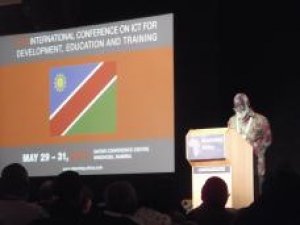eSTEeM
Centre for Scholarship and Innovation
A thoroughly refreshing conference
15th August 2013
The eLearning Africa Conference was founded and organised by ICWE GmbH, Germany, and sponsored by Dell, Microsoft and NComputing, as well as Unicef and numerous others. This year it took place on the 29-31 May in Windhoek, Namibia.
Elearning can give flexibility because of the potential opportunity to promote learning opportunities anywhere and at any time, so is particularly attractive in Africa where there are such vast remote areas. Supply of electricity and internet to remote areas remains a huge problem, but nevertheless the feeling of optimism at this conference was overwhelming. One particularly memorable presentation centred on introduction of computers to a group of schoolchildren in a remote area – most had ever used a computer before, and yet they nearly all had facebook accounts, set up on from a mobile phone!
 The conference had about 1500 delegates, including representation from 42 African countries. It was extremely well organised, although there was considerable difficulty with internet access on the first day. It began with a day of pre-conference workshops, including an interesting one on supporting interactive teaching of maths and science in schools.
The conference had about 1500 delegates, including representation from 42 African countries. It was extremely well organised, although there was considerable difficulty with internet access on the first day. It began with a day of pre-conference workshops, including an interesting one on supporting interactive teaching of maths and science in schools.
The main event included numerous plenary sessions, by politicians, dignitaries, academics, entrepreneurs and the conference sponsors, and presentations on practical applications, digital, traditional and social media, open access, evidence-based and action research, teacher support and development, and - of particular interest to me - on improving healthcare delivery. Projects which had similarities with the OU’s HEAT project, included one exploring a blended approach to fieldworker development in medical research in The Gambia, and one involving training of healthcare workers in Tanzania.
My own presentation on ‘Piloting use of podcasts to bridge the gap between scientific research and teaching’ was in a session on ‘How digital media inspires learner-centred learning’ and included simultaneous French translation. It centred around an interview I filmed with a researcher in Nigeria about his work on Lassa fever, which is now being used for OU students on SK320 (Infectious disease and public health), and the possibility of building a bank of similar resources to showcase African science, as a resource for educators, and also as a way for African scientists to publicise their work more widely. It evoked considerable interest, especially from delegates from the Tanzanian Training Center for International Health, and those involved in work at the MRC Unit in the Gambia.
The event provided a wonderful opportunity for finding out about many establishments offering Distance and Open education which have appeared in recent years, including the People’s Open Access Education Initiative, based in UK, which offers affordable Masters courses to students from developing countries using volunteers as tutors, the African Virtual University, based in Kenya but with a presence in at least 10 other African countries, offering teacher training in English, French and Portuguese, and the recently opened Open University of Tanzania.
Other delegates from the OU were Danny Nti, Director of the OU International Office, and Ellen Scott, Senior Project Manager in the Development Office.
Written and image by Dr Janet Haresnape, Faculty of Science, Janet.Haresnape@open.ac.uk
News
- The Benefits of Developing a Community of Practice for OU Associate Lecturers 11th March 2024
- Registration now open for the 13th eSTEeM Annual Conference 27th February 2024
- eSTEeM Call for Scholarship Proposals January 2024 22nd January 2024
- The 13th eSTEeM Annual Conference 2024: Call for abstracts now open 5th December 2023
- New eSTEeM projects now up and running 30th November 2023